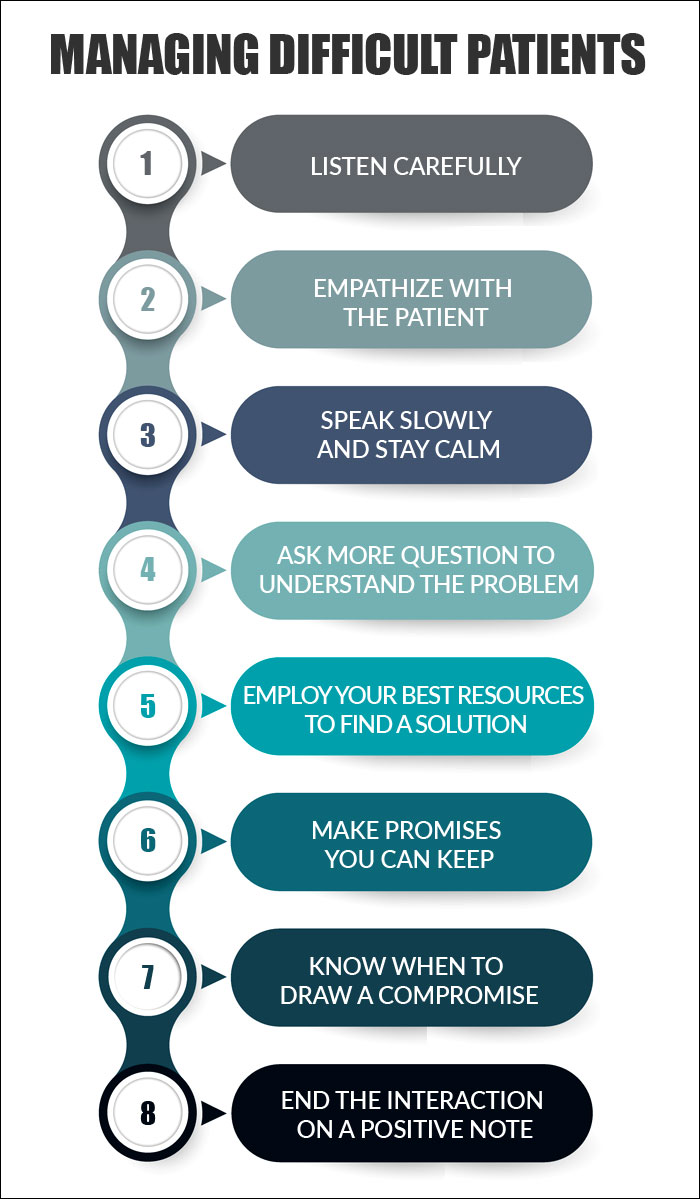4 Types of Difficult Patients Every Doctor Has to Deal With
Posted on
Patients are the lifeblood of your medical practice. They are essential to your practice. This statement is true, considering that no practice can survive without patients. If you have a service that no patient is willing to pay for, you will never have a stable practice. Patients pay the bills and provide opportunities for you to grow.
However, sometimes we encounter patients who act like they were sent straight from hell. Difficult patients can leave you and your staff angry, empty and frustrated. But the way you handle difficult patients will define the quality of your patient experience. Not knowing how to deal with difficult patients may lead to low staff morale, low patient volume and a damaged reputation for your practice.
Regardless of how good your service is, it is just a matter of time before you can have your first encounter with the patient from hell. You just cannot avoid it. Typically, a difficult patient will want to take up all of your time so that you can focus on his or her issue, frustrate you and your team and haggle with you endlessly to give them more time or to get some freebies.
Keep the following points in mind when dealing with difficult patients:

1. According to a report by American Express, 60 percent of people decided doing business with an organization due to poor service experience. This means that disappointing your patients, no matter how difficult they are, can cost your practice a great deal of revenue.

2. Your most difficult patients may not generate the majority of your income. According to the 80:20 rule, 80 percent of your resources will be consumed handling just 20 percent of your patients. This means patients who cause the most trouble probably generate about 20 percent of your total revenue.
3. If you are just getting started, bad reviews can severely impact the growth and reputation of your practice. Even one negative review can impact your ability to attract more patients.
4. If you and your team have been fortunate enough not to face terrible patients yet, it is still advisable to develop some protocols and procedures to follow, if an issue arises.
Dealing With Difficult Patients
There are two ways to handle a difficult patient:
The first approach is that a particular patient is always demanding, and you do not have to listen to him/her.
The second approach is to spend extra time with that patient. You listen to the patient carefully, explain the problem and offer a solution.
However, sometimes – no matter how much time you spend listening and delivering good service – it is just not enough. There will always be patients who are not satisfied with your time and service. The key is to handle these situations head-on while serving your other patients and protecting your integrity at the same time.

Here is a look at a variety of patients who have been driving medical practitioners and their staff nuts for decades, as well as tips on how to handle them:
1. The Demanding Patient
This is the kind of patient who does not care that something is not available or cannot be done at the moment. He/she cannot imagine you do not have some facilities or service. He/she cannot believe you are not working on Sunday and you do not offer any discounts or freebies. Also, this type of patient cannot show his or her disappointment in any other way than by resorting to anger.
Basically, this type of patient will demand service that you may not be able to deliver: a special discount or special attention from your staff this very instant. It is not uncommon for patients to be demanding, even loyal patients. Spending more money on your practice can make this situation worse.

Battling through the abuse of a demanding patient can be difficult. It is understandable that you do not want to lose their business; but at the same time, you are not sure how to meet their standards.
How to Handle Demanding Patients
A demanding patient is not a mean person. It is just that things are not as he or she imagined. Such patients usually threaten to leave, but this is because they are often insecure about their own business.

The best way to deal with demanding patients is to give in. Do the best you can to meet their expectations, but tell them that you are going the extra mile. If you are working harder for them but are not communicating the effort, they may become more demanding, and at some point you will find it impossible to meet their expectations.
Be patient and do not respond to emotions. You must wait for the patient to calm down and explain the situation. Learning to say no can also be useful.
2. The Confused Patient
For some strange reason, this type of patient does not know what he or she wants and just cannot make a decision. They may ask for your opinion to help guide them through the process. This makes the process of helping them very difficult, and at times frustrating. Such patients will ask you a zillion questions but still will not buy your service no matter the quantity and quality of support you provide.
Confused patients usually want to be sure that they are getting the best quality and price. They are afraid of making mistakes. This is why they keep asking questions and comparing services, and even providers.
These types of patients are the classic time-wasters. They will rob you of all your energy and time, and they still will not buy. Although such patients are often polite, they can be draining on your productivity.
How to Handle Confused Patients
The key to handling a confused patient is to understand their problem area. What exactly are they most concerned about? Quality? Price? Quantity?
When you know what bothers them the most, it will be much easier to help them make a decision. Another way to encourage confused patients toward a decision is to offer discounts or freebies. Give them a discounted price or a free service. Better still, you can introduce some urgency to “help” them make a decision.
Either way, it is important to be strict with this type of patient. If not, they will eat up your time and energy and leave you exhausted – without any money, of course.

3. The Complaining Patient
It is hard to satisfy patients who are complaining. It is not because you cannot solve their problem, but because they are constantly creating new problems and keep on ranting and complaining about them. It is their nature.
This type of patient always has something negative to say. Either he or she will not like your staff or service and may even resort to name-calling. For some doctors and their staff, a complaining patient can be the hardest of all patients to deal with because saying “sorry” will not be enough.
How to Handle Complaining Patients
Even if you manage to fix the issue, a complaining patient may not even notice it. One thing is sure – such patients will find another problem very soon.
It is important to recognize when the problem has gone too far and to make sure to document the conversation. However, if the patient is unpleasant, it is critical to make the patient feel heard.
Ask your patient what went wrong and what service or experience has upset them. This kind of attention and empathy can remind them that they are essential to your practice. Make them feel important, and invite them to fill out a patient feedback survey that can be used to improve your processes.
4. The Impatient Patient
Impatient patients are always in a hurry. Everything is an emergency for this patient. They will constantly call, waste your staff’s time and exhaust your team. They often tend to make a mountain out of a molehill. Another characteristic is that they want to enter your office, have a quick appointment and leave as soon as possible. This type of patient will insist that other doctors could do what you do ten times faster while blindfolded. They may not be as picky about other issues, but they are always in a hurry and like to remind you they have a schedule to adhere to. Unfortunately, this does not mean you do not have other things to do or other patients to see.

How to Handle Impatient Patients
All patients deserve a prompt response and quick action, regardless of how difficult they are. However, you cannot bump a patient to the top of the queue just because he/she may lose patience. Do your best to explain why things are not moving as quickly as he or she would like, assure that you appreciate his or her patience, and do your best to serve as quickly as possible. In addition, provide reassurance that everything is under control.
The Bottom Line
At times, managing difficult patients can hinder your ability to get your work done. But if handling difficult patients is seen as an opportunity rather than trouble, you may find that you can strengthen your patient service skills while retaining their business.
It is not fair to blame the difficult patients. As long as you are in the business, you will surely encounter difficult patients from time to time. They will always be there. It is your job is to handle them happily and successfully.
Always remember that your ability to successfully handle difficult patients will lead to greater respect for your practice, more patients, higher revenue and increased staff morale.
By applying tips shared in this article, you can adapt to their tactics and convert them to friendly and loyal patients.

 What Is YMYL and What It's Impact on Healthcare SE..
What Is YMYL and What It's Impact on Healthcare SE.. 7 Christmas Social Media Post Ideas for Hospitals ..
7 Christmas Social Media Post Ideas for Hospitals .. How to Create a Winning Healthcare Marketing Strat..
How to Create a Winning Healthcare Marketing Strat..